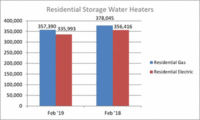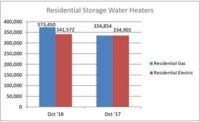American Water Heater introduced its Flame Guard Safety System at the National Hardware Show and planned on having the technology available on two lines of its water heaters in October. Flame Guard is a technology incorporated into the design of the water heater burner system. It works by trapping flammable vapors that enter the combustion chamber and preventing them from escaping where the fire can spread.
"This is one of the most significant home safety innovations in at least two decades," said Robert Trudeau, American's president. "It is by far the most significant change in the design of water heaters in the past 40 or 50 years. There is no development during that time that would top this one.
"We have chosen to enhance our products by embracing this new science. We believe we have a solution that is very cost effective and that we are very The water heater industry is addressing the problem of fires caused by gas burners igniting vapors from flammable fluids stored nearby. Several water heater manufacturers are developing devices that will reduce the risk of fire in those situations. One manufacturer introduced its development at an August trade show in Chicago, and a consortium of four other manufacturers is developing its own safety technology.
American Water Heater introduced its Flame Guard Safety System at the National Hardware Show and planned on having the technology available on two lines of its water heaters in October. Flame Guard is a technology incorporated into the design of the water heater burner system. It works by trapping flammable vapors that enter the combustion chamber and preventing them from escaping where the fire can spread.
"This is one of the most significant home safety innovations in at least two decades," said Robert Trudeau, American's president. "It is by far the most significant change in the design of water heaters in the past 40 or 50 years. There is no development during that time that would top this one.
"We have chosen to enhance our products by embracing this new science. We believe we have a solution that is very cost effective and that we are very The water heater industry is addressing the problem of fires caused by gas burners igniting vapors from flammable fluids stored nearby. Several water heater manufacturers are developing devices that will reduce the risk of fire in those situations. One manufacturer introduced its development at an August trade show in Chicago, and a consortium of four other manufacturers is developing its own safety technology.
American Water Heater introduced its Flame Guard Safety System at the National Hardware Show and planned on having the technology available on two lines of its water heaters in October. Flame Guard is a technology incorporated into the design of the water heater burner system. It works by trapping flammable vapors that enter the combustion chamber and preventing them from escaping where the fire can spread.
"This is one of the most significant home safety innovations in at least two decades," said Robert Trudeau, American's president. "It is by far the most significant change in the design of water heaters in the past 40 or 50 years. There is no development during that time that would top this one.
"We have chosen to enhance our products by embracing this new science. We believe we have a solution that is very cost effective and that we are very confident in."
In a separate action, the Water Heater Industry Joint Research and Development Consortium has been developing its safety device for four years and plans on introducing it to the industry in 2001. Members of the consortium include Bradford White, GSW, Rheem and State Industries. The consortium is being coordinated by Jack Langmead, former vice president and director of technical services at the Gas Appliance Manufacturers Association.
Both efforts are reactions to more than 2,000 vapor fires, 320 injuries, 20 deaths and more than $26 million in property damage caused by water heater burner system fires each year, according to the U.S. Consumer Product Safety Commission. Fires typically occur when vapors from flammable liquids such as gasoline or paint thinners come into contact with a water heater's burner or pilot light.
"There are three important innovations represented in the Flame Guard Safety System," said Tim Shellenberger, American's vice president/product engineering. "First, the patented combustion chamber of the Flame Guard Safety System is totally sealed to prevent extraneous air intrusion except through the system's patented flame arrestor.
"Second, the stainless steel flame arrestor utilizes tiny slots to prevent burning vapors from escaping back into the room where the fire is likely to spread. Third, a special patented thermal switch inside the combustion chamber shuts off the gas supply to the burner and pilot light during a flammable vapor incident, disabling the water heater. This allows the flammable vapors to burn themselves out without any additional fuel."
American worked with members of American Gas Association Research, the Gas Research Institute and Arthur D. Little Inc. during the testing of the technology. American helped develop new American National Standards Institute test standards to ensure the effectiveness of gas water heater-related flammable vapor technologies.
The CPSC in August awarded American Water Heater with the chairman's safety commendation for introducing technology that prevents gas water heaters from igniting flammable vapors. CPSC Chairman Ann Brown said American's device is a significant safety improvement that solves a once unsolvable safety hazard, and she encouraged consumers to look for this technology when purchasing water heaters.
The consortium also has worked with the American National Standards Institute to develop industry-testing standards, which include a series of gasoline spill tests to demonstrate real-world performance.
The consortium has designed several water heaters that are being tested throughout the United States and plans on introducing flammable vapor-resistant water heater technology in 2001.
"The consortium is developing several technologies," Langmead said. "We are developing several technologies because you can only move so fast on one, and we are trying to use our resources as best we can. The technologies we are developing are internal, and water heaters that use the new technology will have the same footprints they had before. Once developed all technologies will be available to member companies.
"It has taken since 1995 to get to this point because it is a difficult task. We have gone down several paths and some of them have led to dead ends and others to problems. We solve one problem but create another. This is a time-consuming, difficult and expensive effort and we want to do it right because our customers' safety comes first," he added.
Consortium members have not decided if its technology will be made available to nonmembers, Langmead said. With proper licensing that is a possibility, but that decision will be left to each consortium member once the technologies are developed.
American was part of the consortium since its inception but opted out when its parent company, Southcorp Australia, divulged its Flame Guard technology and offered to license it to each consortium member at a meeting in October 1998 in Atlanta, American's Trudeau explained. The consortium passed on the Australian technology, and American signed a licensing agreement with Southcorp and incorporated the technology into its water heaters.
"The rest of the consortium members felt that they were pursuing and developing technologies that had greater potential as far as safety, cost effectiveness and in general," Langmead explained.


